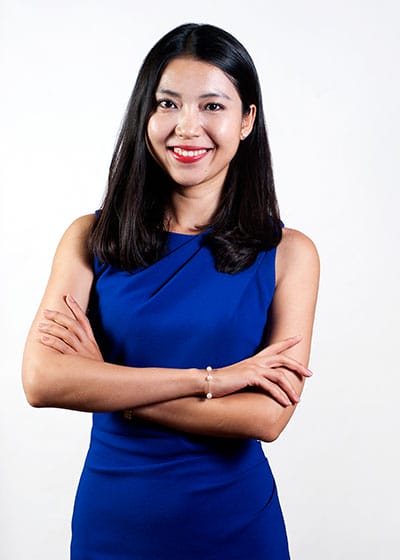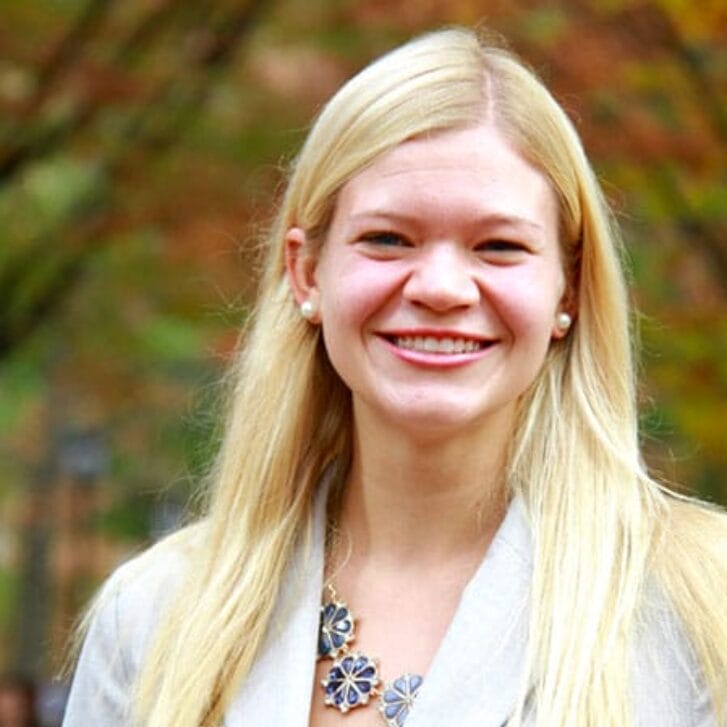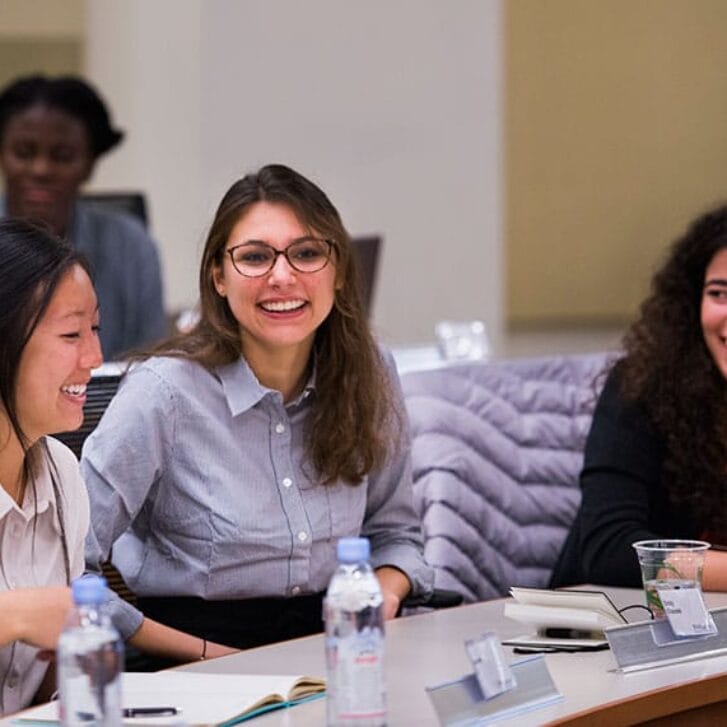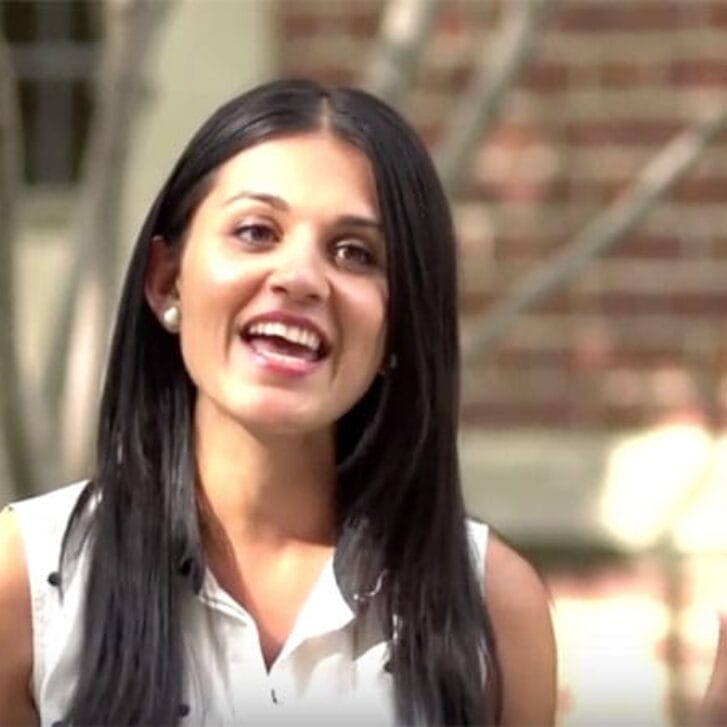As we write this, Penn students are again flooding campus. They’re holding up street traffic as they move into their dorms. They’re clogging Locust Walk. They’re forming long lines at the checkouts of every coffee shop, restaurant and food truck in University City. Each year, this descent on campus never gets old or less impressive or exciting.
It’s even more exciting when you take a closer look at the incoming Wharton freshmen and first-year MBAs—at the individuals, the very different individuals, who make up the incoming student stats we frequently toss around, about percentages of this and percentages of that, who came from here or there.
All Wharton students are special on their own terms. We hope to give you a sense of this. Our page count prevents us from profiling all of the more than 1,600 full-time MBAs, 200 executive MBA students or 2,400 undergrads. But what we have done is select a few of these rare gems—two Penn freshman, two first-year MBA students and, in the case of the WEMBA program, a recent grad and current student.
Recipe for Success

Arianna Alexander (Photo: Rebecca McAlpin)
Step One: Begin by emptying the contents of acceptance letters from six Ivy League schools and gently whisking them together in a large mixing bowl, followed by the contents of 20 other university acceptance letters.
Step two: Slowly fold $3 million in scholarship offers into the mix, including one from the prestigious Gates Millennium Scholars program.
Step three: Pour the resulting mix into the form of a student from Chicago’s Hyde Park and allow to set overnight.
So, just what is this a recipe for? None other than Arianna Alexander, incoming freshman and budding restaurant empire builder.
If you couldn’t tell by now, a love of baking and cooking is an integral part of Alexander’s life, which she says she received—in equal parts—from her grandmothers.
Both were born in the South, she says, and both are passionate about soul food. But while one stayed in Georgia and honed her craft as a caterer for three decades, the other traveled and instilled in Alexander a love of eating at new restaurants.
Alexander says her desire to become a restaurant impresario—she’s already planning the menus of four different ones—was born out of that genetic passion for food.
“I knew I always wanted a restaurant, but I didn’t see it as a business as much when I was a kid,” she says. “But as I got older, I realized that restaurants are a big deal, and they are serious business.” As high school graduation neared, she says, people were pushing her toward culinary school because of her passion for food.
“But at the same time,” she says, “I knew that I could just hire a chef. I need to learn how to run the business. And I can learn that here at Wharton, which will then help me to open up one restaurant, and then another and then eventually all four. Who knows? Maybe even more.”
Shortly after her acceptance-letter haul was tabulated—again, 26—she was interviewed by the local ABC news affiliate WLS in Chicago. Alexander, the youngest of four siblings, told the station she was inspired to aim high with encouragement from her parents after seeing a fellow Kenwood Academy student awarded with about $1 million in scholarships. But there was never much doubt about where she would end up, despite the avalanche of acceptance letters and scholarship offers.
“None of the other 25 schools had a business school like Wharton. At the same time, I wanted to be in Philadelphia because I wanted to be in an urban environment. It’s kind of similar to Chicago in terms of size and it’s a foodie city, so it’s perfect for me.”
While she has yet to open a single restaurant location, demand for her culinary creations is already building.
“I’ve already told a few people that I’d bake cookies for them [at Penn],” she says. The apparent lack of access to cooking facilities in freshman housing seems to be but a small matter to someone as determined as Alexander. “It’s going to be my mission,” she says with a laugh.
Live! From Beijing to Times Square

Sharon Nie (Photo: Rebecca McAlpin)
Chances are good that if you’ve been to New York City’s Times Square in the past few years, you’ve seen Danyangzhi “Sharon” Nie, but only if you were looking up among the dazzling display of bright billboards.
As a news anchor on Xinhua’s CNC World network, she’s been in the news game for more than a decade, working for China’s state-run agency’s English-language, 24-hour, news channel (available via satellite in Europe, Asia and parts of Africa). Her face appears in the network’s pulsing promotions in the heart of the media world.
In addition to providing the face of the network, Nie also did her share of the heavy lifting in order to get it off the ground. So much so that her work for the newly created English-language venture was a major factor in China’s State Council’s decision to proclaim her the youngest recipient ever of its Outstanding Youth Prize in 2011.
Nie, a degree holder from Beijing’s Communication College of China (where she is also pursuing a part-time master’s degree in communications), is a Class of 2017 Wharton MBA candidate. Raised in China’s southwest Sichuan province—“the home of Kung Pao chicken and pandas,” she adds—she was seemingly born with journalism in her genes, as both her parents work in the country’s media industry.
After graduation from Beijing’s Communication College, she joined the state-run Xinhua news agency as an anchor for the 80-year-old service. But the department she joined was only in its infancy, formed with the intention of creating a product similar to CNN.
“That was our vision,” she says. “We worked really hard to put that together. We started out as a team of six or seven, and now we have a newsroom of 70.”
While working as news anchor and hosting four different programs in English, she says, she gained exposure to the business side of the media industry through interviews with various influential figures.
“It made me realize that, if I wanted to have much more impact,” she says, “I needed to work on the business side. That’s why I decided to apply to business school, and Wharton instantly clicked with me. It’s very prestigious, and I want to acquire a really hardcore, analytical business skill set.”
She recently completed an internship with a venture-capital firm in China and describes the media scene there as “vibrant” and full of “opportunities and possibilities.”
“The media industry in China has really become different than what it was five, 10 years ago,” she says. “And I want to be the one who is prepared in terms of knowledge and network.”
So, the next time you see Nie, it may very well be at the head of a boardroom instead of on a billboard.
Presidential Pinnacles Into Prologues

Dipak Kumar (Photo: Rebecca McAlpin)
On some day in the not-too-distant political future, opposition researchers will no doubt come upon the 23-minute, 24-second point of a YouTube video of Dipak Kumar’s retirement address as president of the California Future Farmers of America (FFA). And then they will throw their hands up in frustration when they learn that sometimes fate has a funny way of announcing itself well in advance.
For at that very second in digitally frozen time, a photograph of Kumar and an FFA colleague appears on the screen, with the pair smiling in their trademark blue corduroy jackets and posed directly in front of the White House.
Judging by the speech he delivered before 6,000 FFA members—without a podium, pause or written note to be seen or heard anywhere—Kumar already possesses and displays a presidential manner, which he polished over the year-long deferment between his high school graduation and his matriculation into the undergraduate program, a deferment Wharton granted him on the very day of his election to the FFA presidency, no less.
Even if a Pennsylvania Ave. address isn’t in Kumar’s cards, there may be an even more noble calling in his future: continuing the work that his father started on the family’s farm, which grows almonds, walnuts and pistachios in California’s Central Valley. (Both of Kumar’s parents are also local doctors.)
“I’ve gotten a lot out of California and the people here,” he says. “So I think, for me, just going and figuring it out [at Wharton] and bringing it back here and sharing with other people, I think that’s my calling.
“People in my part of the world, they struggle. There’s a lot of poverty around, and I’d love to be able to use my background to create change,” he says, citing the current tangle of water, trade and education policies that encircle California.
“They all affect the industry I care about: agriculture,” he says, “and I want to learn how to be a part of that. I see agriculture as a vehicle for economic prosperity here in the valley. … I aim to find a way to bring Wharton and its power to use business to change lives positively here.”
Kumar is careful to keep his achievements in perspective, however, likening his FFA retirement speech to the time when he was in seventh grade and he landed on the cover of the local newspaper for winning second place in the county spelling bee.
But it’s hard even for him not to see that his current-day pinnacles are bound to turn into prologues to even greater achievements. It’s as clear as the pattern on the blue corduroy FFA jacket that has remained largely unchanged since 1928. (The same jacket he wore every day for a year while traversing the state and fulfilling his duties as state president.)
“I hope that one day I can look back on that retirement address and say, ‘Man, that was a great start.’”
From Power Plant to Global Grid

Ndidi Obaji (Photo: Rebecca McAlpin)
Much has been made recently—and rightfully so—about the lack of both women and minorities in the ever-blossoming fields of science, technology, engineering and math—the so-called STEM fields. What hasn’t been talked about nearly as much is that same lack of representation in the venture capital industry.
Now meet incoming MBA student Ndidi Obaji. With a bachelor’s degree in electrical engineering and a master’s degree in sustainable energy, Obaji represents a new breed of female engineers who are not only breaking down the barriers for women who may want to pursue STEM jobs in the future. She’s also helping to serve as a conduit between an energy plant’s control room and an energy company’s C-suite.
Born in New York City to Nigerian parents, Obaji grew up in Owerri, Nigeria, where she showed an early proclivity for math. Her father encouraged her to pursue a career in the hard sciences, which eventually developed into an interest in Africa’s sustainable energy sector.
As a first-year MBA student, she looks forward to living in Philadelphia and seeing a different side of Pennsylvania, compared with State College, where she did her undergraduate work.
Upon graduation from Penn State University, she began work as an engineer at an ExxonMobil refinery in Texas, where she first began to realize the depth and scope of the energy market.
“At that point, I was more concerned with issues at the plant level,” she says. Before long, though, she realized a master’s degree would enable her to better understand and influence global energy issues, “as well as energy policies and implementation of these policies.”
Her time at Imperial College London in 2010 and 2011 presented her with what she calls “a good opportunity to learn about the energy industry from a higher level.” She also took the opportunity to research biomass renewable energy technology in Zambia, where agriculture still largely drives the economy. While doing her master’s in London, she was first exposed to venture capitalism “and looking at innovation and how to commercialize innovative technology in a startup energy tech firm.”
She soon realized that, to fuel her future in venture capital and energy finance going forward, “an MBA would be a really good thing to have.
“I also wanted to further develop my leadership skills,” she says. She returned stateside after receiving her master’s degree, and, in 2011, attended a Wharton energy conference. It was there that she landed her most recent job, for Conoco Phillips’ Technology Ventures team.
“I had a very positive impression at the 2011 conference, and this definitely influenced my decision to apply to Wharton,” she says. “I was attracted by Wharton’s strong focus on energy and presence in the industry.”
At her ConocoPhillips’ job, she was responsible for ensuring integration and commercialization of technologies sourced through equity investments in startup companies.
“I returned to business school to round out skills in finance and management,” she explains. “I believe these are important skills required for leaders in the energy industry.”
Does she have plans to return to Nigeria and maximize the opportunities of the current energy situation on the continent?
“That would make for a nice story,” she says, “but I’m open to making an impact and adding value wherever I can. One step at a time, one day at a time.”
In a Higher Gear

Dan Jones (Photo: Kim Kolanowski)
When Roger “Dan” Jones WG15 tells you with his gentle Southern drawl that his “skill set is a little different,” it would be prudent to believe the May 2015 graduate of Wharton’s MBA for Executives Program. After all, would a divinity-degree holding church pastor lie to you? How about one with a law degree to boot?
Jones, the pastor at Bethany United Methodist Church in Houston for the past nine years, previously earned a divinity degree from the Perkins School of Theology at Southern Methodist University in 1989 and a J.D. from the University of Houston Law Center in 1999.
In his tenure as pastor, he watched as the neighborhood surrounding the church underwent a regentrification, causing rents to rise and squeezing longtime residents out of their homes. A sinking membership compounded that painful process, so Jones decided to turn into the wind and get more involved in the immediate community. A market study soon revealed that “the underserved need” was elder housing, says Jones, who then began the long process of building a senior housing facility on the church’s property.
He soon realized that, while his very unique skill set was indeed multifarious, it lacked the prerequisite background in finance that would prove necessary in moving the project forward. After researching the educational options, Jones, a veteran staff member of some of the biggest megachurches throughout Houston, soon had an epiphany.
“The truth is, it was Wharton, or I wasn’t going to go,” he says of his decision to get an executive MBA. “Harvard and Stanford don’t offer what I was looking for. I wanted two things out of the MBA: a comprehensive, rigorous curriculum and a brand that had leverage.”
But the process proved to be a bumpy—yet worthwhile— journey. A Wharton MBA is so demanding when you’re working full time. He says, “I really struggled during the first term. And then I found a gear I didn’t know I had.” He credits that “gear,” in part, to his classmates.
“I was blown away by my classmates and their capabilities,” he says. “I knew there would be interesting people, but the cohort was maybe the best part of the program.”
Perhaps the most unenviable part of the process, he says, was his schedule.
“Every other weekend, I’d fly out to San Francisco on Thursday night and then take the red-eye back on Saturday night. I’d get in early Sunday morning, then preach two services,” he says with a weary laugh. “I did that for two years.”
But there’s far more to all that travel torture than a man of God’s effort to fulfill his vocation on a local level.
“If I can pull this project off,” he says of his senior housing idea, “it will give me leverage to scale the idea out. … And a Wharton degree definitely gives credibility to the theory and opens more doors for us.”
Other ordained ministers must have seen this light of having an MBA and a law degree, right?
“I don’t know if there’s another fool like me on the planet,” he says.
Redefining What’s Possible

Jodie Reynhout (Photo: Rebecca McAlpin)
Despite the landlocked layout of her organization’s headquarters, located on a 12-acre campus in the Hunting Park section of Philadelphia, Jodi Reynhout nonetheless finds herself building bridges on a daily basis. As vice president of administration at Esperanza Inc., Reynhout is committed to linking people and resources through a seemingly endless variety of programs.
The focus of the Hispanic-owned and -operated nonprofit community development corporation is “primarily on that demographic,” she says, “but we serve a very diverse community.”
The organization, she says, is taking an asset-building approach to community development by working to grow institutions “that will strengthen and revitalize the community, that will provide our community members with access to educational opportunities, to economic opportunities,” she says, including a charter school, a cybercharter school, and programs for real estate development and immigration services.
“Workforce development is another important part of our portfolio,” she adds. “Getting people the skills and training that they need to access better-paying jobs and sustainable wages.”
As for her personal workforce development efforts, she’s a candidate in Wharton’s MBA for Executives Program, projected to earn her degree by April 2016. She readily acknowledges that it may not be the typical advanced degree that is to be expected for someone in the nonprofit field.
“I’m getting an MBA,” she says, “because I think that nonprofit organizations should do more with their money, should do better with their money, certainly should make more money in unconventional, creative and innovative ways, and should be more entrepreneurial than they are.”
They already do a lot. Consider that “all the things that nonprofits do are for the strengthening of the economy, the social structure and the advancement of our country as a whole,” says Reynhout, who was born in Chicagoland but lived in Rubio, Venezuela, from ages 7 to 16.
Since joining the WEMBA program, she has cultivated relationships with colleagues in the impact investing space and in corporate social responsibility at for-profit organizations. So in addition to her own personal development toward one day helming her own nonprofit organization, she’s actively engaged in laying the foundations and stringing the cables that are required to connect the disparate worlds of high finance and community development in a meaningful way.
“How can we create the bridges between these pockets of activity that really all do have a common interest in the common good?” she asks. “How do we create more capital and more power by linking with each other and finding out what are the common interests?”
Aside from being a networking boon and bolstering her finance and analytical bona fides—her bachelor’s degree in performance studies from Northwestern University did not require calculus classes—Wharton has also forced her to re-evaluate some pretty big decisions. Up to a point, that is.
“If there’s one thing to be learned at Wharton, it’s that you can do anything you put your mind and effort to,” she says, “and it really has broadened my perspective as to what’s possible for me in the social impact field.
“But I’m staying here [in the nonprofit world],” she adds with a laugh. “I’m not becoming an investment banker.”
Michael J. O’Brien is a writer living in Keswick Village, Pa. He holds a degree in economics from Boston College.


























